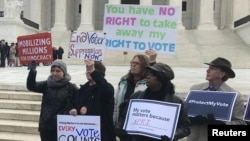The U.S. Supreme Court has upheld Ohio's policy of purging infrequent voters from the state's registration rolls.
Under Ohio election laws, a voter in the state is sent a notice if he or she fails to cast ballots in a federal election cycle. If the person does not vote in the subsequent four years, his or her name is purged from the rolls, requiring the individual to re-register to vote.
In the case, Husted v. A. Philip Randolph Institute, the high court's conservative jurists ruled that the Ohio measure did not violate U.S. federal law.
"It has been estimated that 24 million voter registrations in the United States — about one in eight — are either invalid or significantly inaccurate," Supreme Court Justice Samuel Alito wrote in the court's 5-4 opinion.
Alito mentioned a 2012 study by the Pew Research Center, which was cited by the White House in alleging that voter fraud was occurring within the United States. The Justice Department supported the Ohio law in a reversal from the previous administration.
Several voting rights advocacy groups have raised concerns about the ruling, citing its potential to disproportionately affect low-income and minority voters. A 2016 analysis by the Reuters news agency found that of voting rolls in Ohio's three largest counties, "neighborhoods that have a high proportion of poor, African-American residents are hit the hardest."
"This decision will fuel the fire of voter suppressors across the country who want to make sure their chosen candidates win re-election — no matter what the voters say," said Chris Carson, president of the League of Women Voters of the United States, in a statement Monday. The organization filed a brief arguing the Ohio law violated federal law. Carson said, "The right to vote is not use it or lose it."
Similar sentiments were echoed by Celina Stewart, director of advocacy and litigation for the League of Women Voters. Stewart told VOA, "Our fear is that this would encourage states to put up further barriers to voting."
Stewart said the warning provided to Ohio voters was too vague, and did not clearly articulate that a failure to respond meant potentially losing the right to vote.
The case originated in 2015, when Larry Harmon, a software engineer from Kent, Ohio, showed up to vote on a local ballot initiative, but was turned away because his name had been removed from the list of eligible voters. Harmon — who said he did not vote in the 2012 presidential election — became a lead plaintiff in the case as it made its way through the legal system and up to the Supreme Court.
"I've been paying my taxes, paying my property taxes, registering my car," Harmon told NBC News in August. "All the data was there for [election officials] to know that I was there."
Monday's decision comes ahead of midterm elections later this year.




